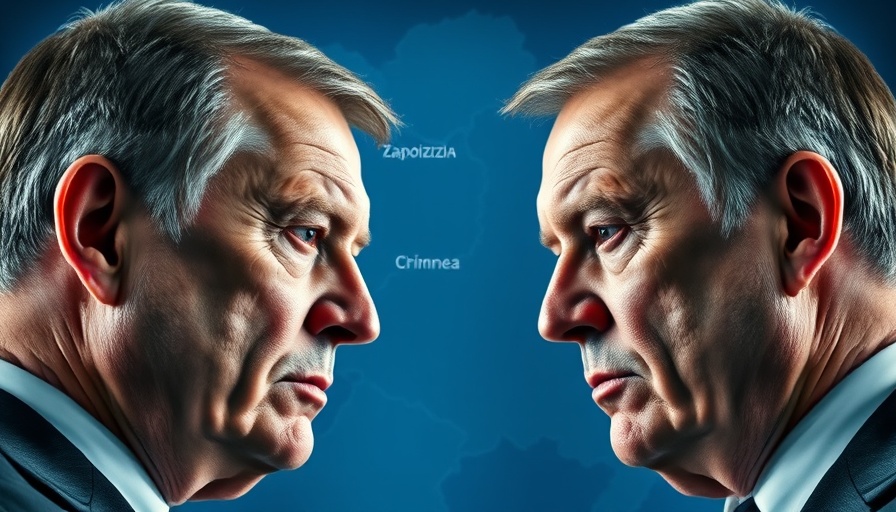
Understanding Putin's Ceasefire Strategy in Ukraine
The war in Ukraine has reached a pivotal moment, with recent reports of a proposed ceasefire backed by the Trump administration. This plan raises complex questions about Vladimir Putin's intentions and long-term strategy regarding Ukraine. While the ceasefire proposal suggests a 30-day pause in hostilities, the implications of such a move warrant careful consideration, particularly from the perspective of the Ukrainian leadership and their allies.
The Stakes for Ukraine Amidst Ceasefire Talks
Ukrainian President Volodymyr Zelensky faces a crucial decision as he evaluates the proposal for a temporary ceasefire. After a string of setbacks, the offer could offer a necessary reprieve for Ukraine, but it might also play directly into the hands of Russia. As reported, the absence of concrete security guarantees poses significant risks; a mere halt in fighting could become an opportunity for Russia to consolidate its gains or regroup forces.
Decoding Putin's Reservations
Following the recent diplomatic meetings, Putin raised legitimate concerns regarding the ceasefire's implementation. His desire for discussions with the U.S. before committing to a truce indicates a strategic maneuvering that hints at Russia's cautious approach to the situation. The Kremlin's insistence on terms before accepting a ceasefire suggests that they are wary of allowing a pause that might enable Ukraine to bolster its military capabilities.
How a Ceasefire Could Shift Global Power Dynamics
This proposed ceasefire is poised to not only reshape Ukraine but also has implications for global geopolitical alignment. Russia, under Putin, seeks to strengthen its grip across Europe, exploiting divisions within the West. Questions abound regarding how key allies, including the U.S. and NATO, will respond to a ceasefire that lacks guarantees for Ukrainian sovereignty and territorial integrity. Will Western nations rally to support Ukraine, or will a ceasefire embolden Russia?
Perspectives on the Ground: Ukrainian Public Sentiment
The Ukrainian people’s sentiment towards the ceasefire is complex and multifaceted. Many citizens share fears that Russian leaders may exploit a temporary halt to legitimize further aggression. Public opinion may lean against accepting terms that appear to prioritize Russian security concerns over Ukraine's sovereignty. These sentiments underscore the broader context of distrust in the peace process, driven by past violations of agreements like the Minsk Protocols.
The International Community's Role and Concerns
As the ceasefire plan unfolds, the international community plays a vital role in safeguarding Ukraine’s interests. The proposed agreement emphasizes the involvement of Ukraine’s European allies, yet the nature of these commitments remains vague. Observers are keen to see how Western nations can influence the discussions to ensure that the ceasefire results in a sustainable peace rather than a temporary pause in conflict. Sanctions and political pressure on Russia could be vital components in compelling compliance to the terms.
What Lies Ahead for Ukraine and Russia?
The proposed ceasefire may represent a critical juncture, but it simultaneously opens the door to future uncertainties. With regional stability hanging in the balance, strategic dialogues involving Russia, Ukraine, and key allies will be essential to navigating complex challenges. The inherent risks for both sides must be assessed carefully: a failure to reach a robust agreement may lead to a return to hostilities or, conversely, a situation where either side exploits the ceasefire for military advantage.
Insights for Entrepreneurs and Business Leaders
For those following the economic implications of geopolitical developments, the situation in Ukraine serves as a reminder of how quickly dynamics can shift. Entrepreneurs in the Bay Area and beyond should factor geopolitical risks into their business strategies, especially in sectors reliant on stable international markets. Understanding the impact of international relations on local economies, including potential disruptions in supply chains and trade policies, is crucial for prudent decision-making.
In the face of economic uncertainty brought about by such conflicts, businesses are encouraged to remain adaptive, seeking innovative solutions and diversifying their operations to navigate potential market disruptions.
As the world watches this ceasefire proposal and its ripple effects, it serves as a timely reminder of the interconnectedness of politics and economics, urging businesses to stay informed and responsive to change.
 Add Row
Add Row  Add
Add 



Write A Comment